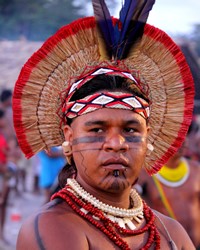Baena in Brazil

Photo Source:
Yves Picq - Wikimedia
Creative Commons
|
Send Joshua Project a map of this people group.
|
| People Name: | Baena |
| Country: | Brazil |
| 10/40 Window: | No |
| Population: | 20 |
| World Population: | 20 |
| Primary Language: | Portuguese |
| Primary Religion: | Ethnic Religions |
| Christian Adherents: | 0.00 % |
| Evangelicals: | 0.00 % |
| Scripture: | Complete Bible |
| Ministry Resources: | Yes |
| Jesus Film: | Yes |
| Audio Recordings: | Yes |
| People Cluster: | South American Indigenous |
| Affinity Bloc: | Latin-Caribbean Americans |
| Progress Level: |
|
Introduction / History
The Baenãs are a Brazilian indigenous group which, in the 20th century, merged with the old Pataxós-Hã-Hã-Hães, with the Camacãs, Mongoiós, Sapuiás-Quiriris, and with part of the Geréns and Tupiniquins, identifying itself since then as Pataxós-Hã-Hã-Hães.
Where Are they Located?
They live on two reservations in southern Bahia. The most populous is the Caramuru-Paraguaçu indigenous reserve, which has 54,099 hectares and covers areas in the municipalities of Itaju do Colônia, Camacã and Pau Brasil. The other reserve is the Reserva Fazenda Baiana, with 304 hectares, located in the municipality of Camamu, in the lower south of Bahia, where about 72 people live. Its current population, according to data from the Instituto Socioambiental, is around 2,200 people.
What Are Their Lives Like?
Around 1920, in Bahia, the Pataxó Indians Hã Hã Hãe and the Baenãs traditionally lived in the large forests between the Cachoeira, Pardo, Gongogi and other rivers. These Indians were nomads, collected fruits and supported themselves from the forests in which they lived, in this region, among: Pau Brasil (formerly Santa Rosa), Camacã, Itaju do Colônia, Palmares, Vitoria da Conquista and other regions. Nowadays, they live in reservations, having access to cities.
What Are Their Beliefs?
Toré is the religion today in the Caramuru-Paraguaçu reserve. It is a possession ritual, through which charms – or supernatural entities considered beneficial – are manifested, which is performed to introduce any activity considered socially significant. Men and women participate in it, smoking tobacco with pipes. Today there are three churches installed on the reservation: Catholic, Jehovah's Witness and Wesleyan. The latter acts as a conventional Pentecostal church, except for the effort to adapt to the local culture, through the use of indigenous symbols, such as maracas and clothing.
Prayer Points
Pray for increased, on-site church planting.
Pray for more laborers.
Pray that many more come to know Jesus as Savior.